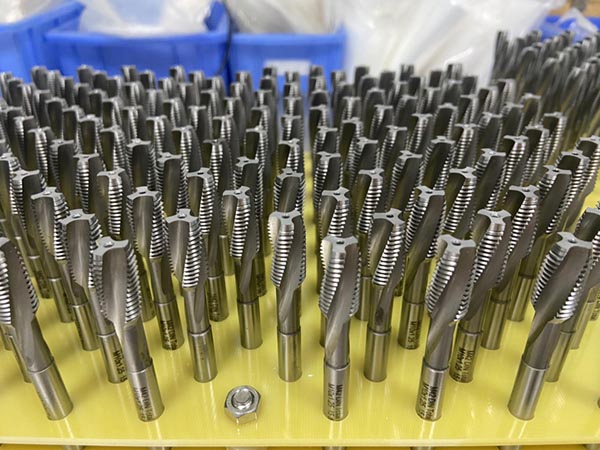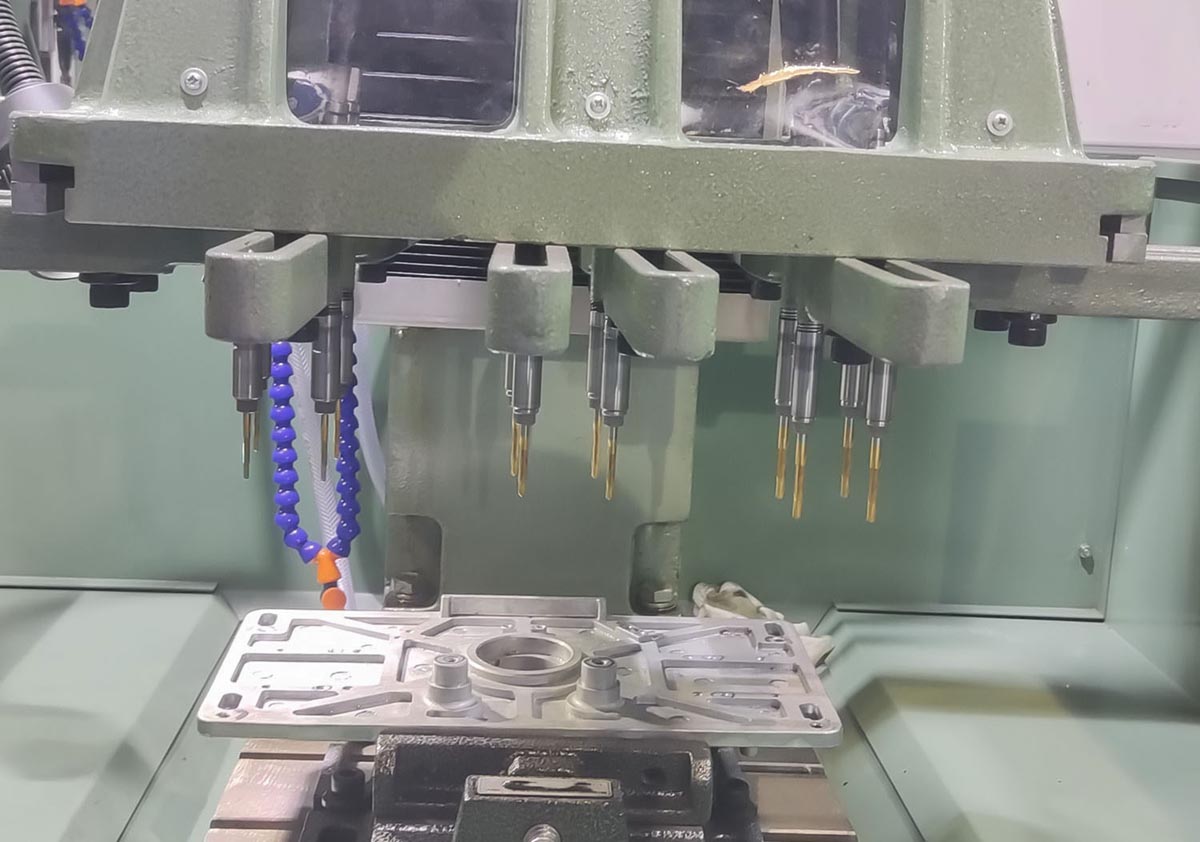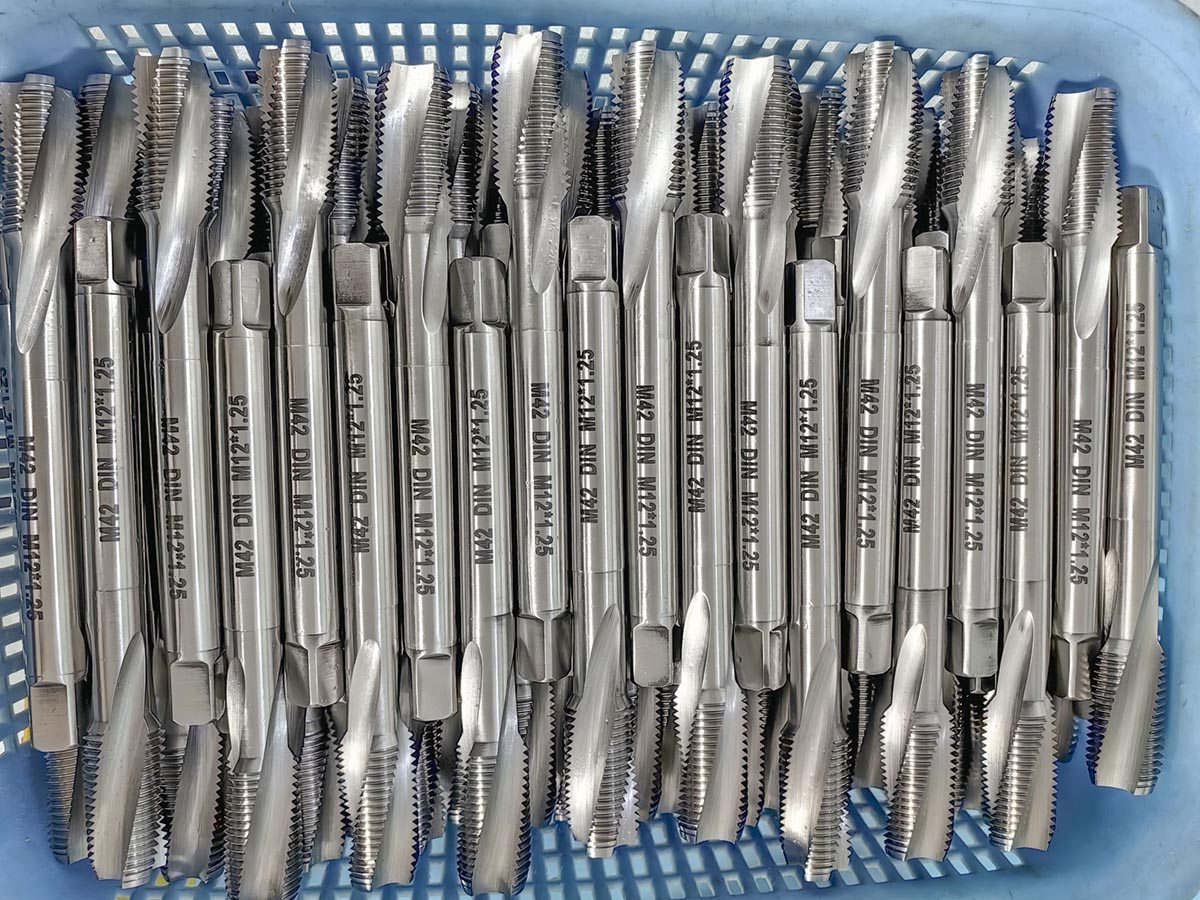
Taps are essential tools for machining internal threads, and their performance significantly impacts the efficiency and quality of threading operations. Different workpiece materials, due to their unique physical, chemical, and mechanical properties, require specific tap materials, coatings, and machining techniques. This article explores the application of taps in common materials, including plain carbon steel, alloy steel, stainless steel, aluminum alloys, titanium alloys, cast iron, and composite materials. Key aspects such as material characteristics, recommended tap materials and coatings, industry applications, and machining suggestions are discussed.
1. Application in Plain Carbon Steel
Plain carbon steel is classified based on carbon content: low, medium, and high carbon steel. It is characterized by moderate strength, good toughness, and relatively favorable machinability. High carbon steel, however, has higher hardness, making it slightly more challenging to machine.
Plain carbon steel is extensively used in automotive and construction machinery. Commonly used taps include straight flute taps and spiral flute taps.
Recommended Tap Materials and Coatings
Tap Materials:
Low and medium carbon steel can be machined using High-Speed Steel (HSS) taps.
High carbon steel requires High-Performance HSS taps, such as HSSE-M35 or HSSE-M42, to handle the increased hardness.
Coatings:
Titanium Nitride (TiN) coatings improve wear resistance and tap longevity.
2. Application in Alloy Steel
Alloy steel, enhanced with elements such as chromium, molybdenum, and nickel, offers high strength and hardness. It also exhibits work hardening characteristics during machining.
Alloy steel is used in power equipment and heavy industry components. Common taps include straight flute and spiral flute taps.
Recommended Tap Materials and Coatings
Tap Materials:
HSSE-M42 (cobalt-enriched HSS) or Powder Metallurgy High-Speed Steel (HSSE-Powder) taps are ideal for machining high-strength alloy steel.
Coatings:
Titanium Aluminum Nitride (TiAlN) coatings enhance heat resistance for prolonged operations.
3. Application in Stainless Steel
Stainless steel is known for its high strength and corrosion resistance but poses machining challenges due to severe work hardening and low thermal conductivity.
Stainless steel is widely used in food processing equipment, medical devices, and chemical processing equipment. Typical taps include spiral flute taps and forming taps.
Recommended Tap Materials and Coatings
Tap Materials:
HSSE or HSSE-Powder taps are suitable due to their toughness and wear resistance.
Coatings:
Titanium Carbon Nitride (TiCN) or Diamond-Like Carbon (DLC) coatings minimize cutting forces and reduce built-up edge formation.
4. Application in Aluminum Alloys
Aluminum alloys are lightweight with excellent machinability, but their high ductility often leads to chip adhesion during machining.
Aluminum alloys are extensively used in aerospace and automotive manufacturing. Common taps include spiral flute and straight flute taps.
Recommended Tap Materials and Coatings
Tap Materials:
HSS or HSSE taps suffice for machining aluminum alloys.
Coatings:
Zirconium Nitride (ZrN) coatings minimize chip adhesion and improve surface quality.
5. Application in Titanium Alloys
Titanium alloys are known for their high strength and heat resistance, making them challenging to machine due to rapid work hardening and poor thermal conductivity.
Titanium alloys are crucial in aerospace and medical implants. Typical taps include straight flute and forming taps.
Recommended Tap Materials and Coatings
Tap Materials:
HSSE-M42 or carbide taps are ideal for machining titanium alloys.
Coatings:
Aluminum Chromium Nitride (AlCrN) coatings improve heat resistance and tool life.
6. Application in Cast Iron
Cast iron is brittle, with excellent machinability due to its ability to break into small chips. However, its low tensile strength demands careful handling.
Cast iron is commonly used in engine blocks and machine tool bases. Standard taps include straight flute and forming taps.
Recommended Tap Materials and Coatings
Tap Materials:
HSS or carbide taps are suitable for gray and ductile cast iron.
Coatings:
TiAlN coatings improve wear resistance and durability.
7. Application in Composite Materials
Composite materials, such as carbon fiber-reinforced plastics (CFRP), are lightweight with high strength but are prone to delamination or burring during machining.
Composites are prevalent in aerospace and high-performance sports equipment. Common taps include straight flute taps.
Recommended Tap Materials and Coatings
Tap Materials:
Carbide taps are preferred for machining composites.
Coatings:
DLC coatings reduce cutting heat and improve surface quality.
The application of taps in various materials requires a tailored approach to tap material, coating selection, and cutting parameters. By understanding the characteristics of each material and optimizing machining techniques, manufacturers can achieve superior threading quality and operational efficiency. With increasing demands for precision and productivity, tap technology will continue to evolve, offering advanced solutions for complex material machining.
OEM Capability
 We like to do design according to all the customers' requirements, or offer them our new designs. With strong OEM/ODM capabilities, we can fill your sourcing demands.
We like to do design according to all the customers' requirements, or offer them our new designs. With strong OEM/ODM capabilities, we can fill your sourcing demands. Categories
| HSS-PM Taps | HSSE-M42 Taps |
| HSSE / HSS Taps | Spiral Flute Taps |
| Straight Flute Taps | Spiral Point Taps |
| Multi-function Taps |
| Solid Carbide Drill Bits | Twist Drill Bits |
| Center Drill Bits | Indexable U Drills |
| Flat-end Milling Cutter | Ball Nose End Mills |


